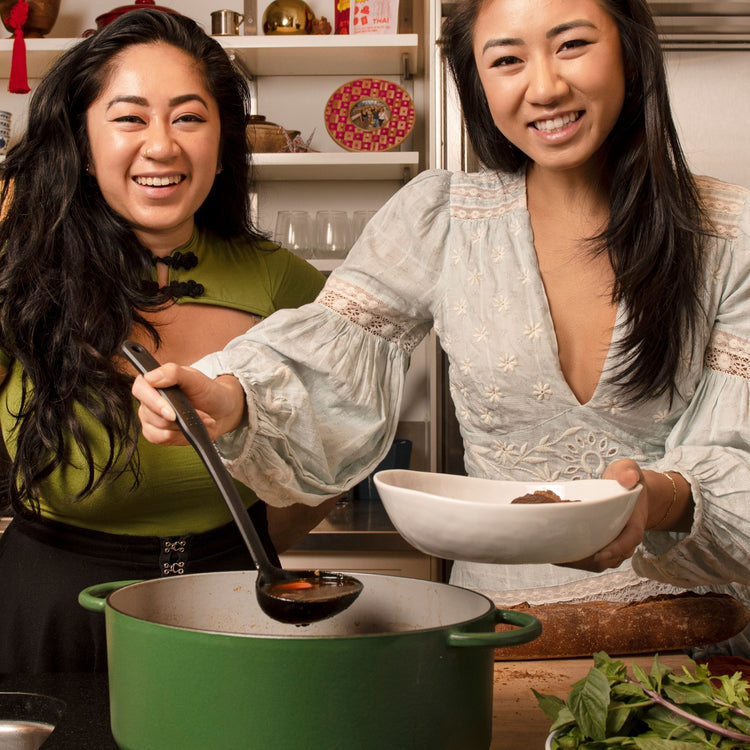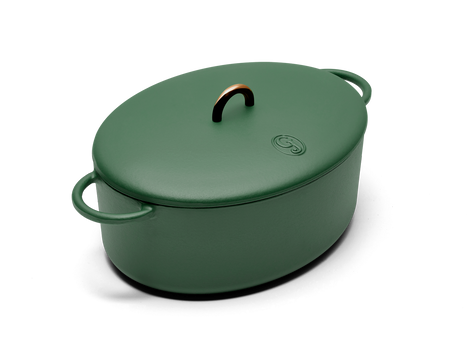Great Ones is a celebration of humans we admire — and an exploration of why they cook, not just how. Growing up as first-generation Vietnamese Americans and daughters of refugees in a largely white town, sisters Kim and Vanessa Pham sometimes downplayed their culture’s food. But with Omsom, their “loud and proud” spice starter brand, they’re writing a new narrative for Asian foods and Asian Americans. Here, Kim explains their unconventional approach.
We're, first and foremost, an Asian-American brand on a mission to reclaim and celebrate the multitudes that exist within Asian America. In mainstream grocery stores, there’s a big disconnect between the “ethnic” aisle — oftentimes quite sad and hodgepodge in the back of the store — and the larger DNA of America, where one-third of the population is composed of immigrants and their children, like Vanessa and me. This aisle is an outdated reflection of who Americans are and how we eat.

Omsom starters are kitchen shortcuts with all the spices, seasonings, oils, and vinegars you need for a particular Asian dish. The name Omsom originates from a Vietnamese phrase that roughly translates to rowdy or rambunctious, kind of in a negative way. Our parents used to get angry with us and say, “Don’t be so omsom!” when we were screeching in the back of the car. But in building Omsom, we became obsessed with this idea of being proud, loud, and unapologetic. We wanted to say fuck you to that idea of Asian Americans as invisible or submissive or a “model minority.”

We bring that rowdiness through everything, from our flavors (none of that gloppy, sugary shit you see in the ethnic aisle) to how our brand shows up in the world to who we are as founders to the things we choose to talk about. We want to reimagine this category from the ground up, in a way that we feel has cultural integrity. We wanted to build a brand that the Asian-American community deserves; there are a lot of brands centered on whiteness, and we wanted to do something really different.
We wanted to build a brand that the Asian-American community deserves.
But what completely surprised us at launch (mid-pandemic) was how many non-Asian folks were really excited about us. We sold out within 72 hours, which is both a reflection of demand but also supply-chain madness. I think the country is being educated on more regional flavors from restaurateurs who’ve been pushing the envelope through things like Ugly Delicious and Chef’s Table. And there’s this rising Asian-American voice and power in culture, with Crazy Rich Asians and Parasite and Eddie Huang, so I think America is getting more and more interested in Asian stories and Asian flavors. We're a brand to help drive that conversation.

We grew up with food, and it’s always, always, always been a big piece of who we are and how we engage with our identities. After work, Mama Pham would come home and make a beautiful three-course meal from scratch, like pork belly with cabbage and fish sauce. It was how my family showed love to each other. Our town was 98 percent white, so for a long time our identity — and our food, as an extension of that — was clouded in shame. I think every Asian kid has a “lunch-box story,” where someone made fun of your food. I tried to hide it or downplay it, and then I went to college and missed these flavors I grew up with.

For us, cooking is a big piece of how we show love, of how we communicate, and how we access our identities. Vanessa is her peak curious self in the kitchen — she loves trying complex skills and new techniques. She voraciously reads cookbooks, and I’m constantly admiring the new dishes she makes. I am very, very different. My cooking is very much a reflection of who I am — I never, ever look at a recipe, I never, ever measure, and I would describe my cooking as “perpetually OTT and always Asian-ish.” I usually cook with a very heavy hand and always in the pursuit of dankness. Think six or seven cloves of garlic, a little bit of MSG, lots of fat, lots of oil. I see my kitchen as an escape, so I generally cook what I know would make me feel comforted.
I would describe my cooking as “perpetually OTT and always Asian-ish.”
This bò kho is a hearty Vietnamese stew that Vanessa and I grew up on — think gorgeous beef shank, tendon, and brisket braising in aromatics (lemongrass, garlic, ginger, star anise, clove, cinnamon, oh my!), low and slow for hours in the Dutchess, until the beef is fall-off-the-fork tender. This super-fragrant stew has a lovely sweetness from the chopped carrots that finish it. Bò kho is typically served with a crusty, toasted French baguette — just dip and savor!
We really love what we're doing with Omsom, and it feels like an extension of our identities and our childhood, so our parents are super supportive, even though they couldn’t understand why we’d give up good jobs to do this. Now that they can hold our products and see what we're doing and read the press, they're really proud. And it comes from them — the recipes, the flavors, and the name is literally something they used to chastise us with!























